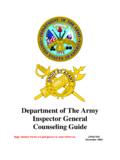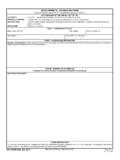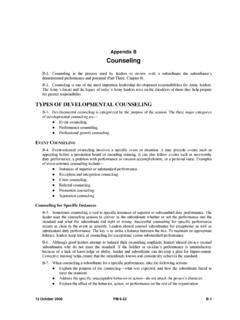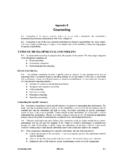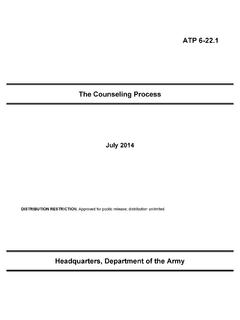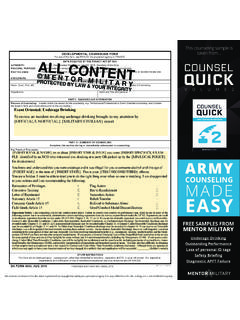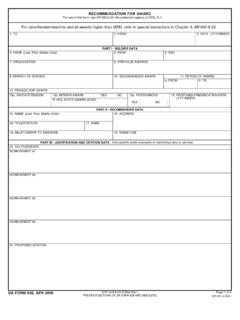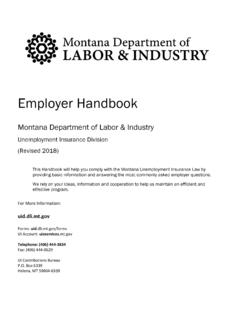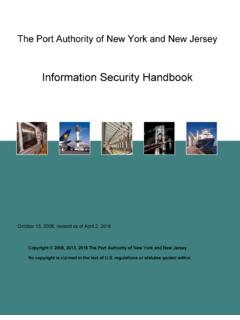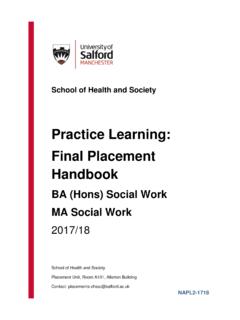Transcription of Army Mentorship Handbook 2005 - Army …
1 army Mentorship Handbook Headquarters, Department of army , DCS, G-1 Attn: DAPE-HR-IRPD-L 1700 N. Moore Street, Suite 1400 Rosslyn, VA 22209 Effective Date: 1 January 2005 TABLE OF CONTENTS Foreword ..3 I. Introduction .. 4 II. Mentoring: Questions and Answers .. 5 III. Stages of Mentoring ..21 IV. Building Mentoring Skills ..24 References ..36 Enclosures: 1 Individual Development Action Plan (IDAP) 2 Mentorship Agreement NOTE: This booklet was adapted for army use from the United States Marine Corps Civilian army Career & Leadership Development Mentoring Handbook . le of Contents 1 January 2005 2 3I. INTRODUCTION. Mentoring is a powerful tool for personal and professional development. Many organizations believe that mentoring improves individual performance, retention, morale, personal/professional development, and career progression.
2 Mentoring offers many opportunities for mentors and mentees to improve their leadership, interpersonal, and technical skills as well as achieve personal and professional objectives. This Handbook provides information on the mentoring process to potential mentors and mentees. It describes the roles and responsibilities of mentors and mentees so that both parties will know what is expected of the other in a mentor/mentee relationship. army Mentorship Definition: The voluntary, developmental relationship that exists between a person of greater experience and a person of lesser experience that is characterized by mutual trust and respect. Note to Mentees: You are ultimately responsible for your own career and personal development. A mentor will provide valuable advice and help you reflect on and learn from experiences, but it is ultimately up to you to take the initiative, demonstrate your capabilities, and seize opportunities and future assignments in order to advance your professional development and career progression.
3 Note to Mentors: on your approach to it, mentoring may be a very easy, natural process. In fact, you ve probably already been mentoring for years whether or not you called yourself a mentor formally. Start off slowly and use the lessons you ve learned from your own mentors to begin the process as well as the material and guidance we provide you in this Handbook . The material in the Handbook is not intended to complicate your view of the mentoring role, but rather to clarify it, increasing your understanding, effectiveness, and enjoyment of your role as 4 II. MENTORING: QUESTIONS AND ANSWERS. Q1: Why Should I Get Involved in Mentoring: A1: Most people think of mentoring as a benefit to the person being mentored, but there are also many benefits to the mentor and the army .
4 For the Mentor: Career Advancement for the Mentor Becoming identified as someone who develops or mentors well known performers or fast trackers can attract highly qualified, high potential individuals who will look for opportunities to work for the mentor in any capacity, and developing others to follow in a mentor s footsteps can facilitate the mentor s own personal/professional development and career progression. Information Gathering Mentees can be a great source of general army /organizational data, feedback, and fresh ideas. Because serving in a higher level position isolates some executives and managers, mentees can serve as an important link in keeping communication lines open. Also, while the mentor might possess the hard facts about army issues, traditions, etc., mentees will often provide important feedback about how people at different levels of the army view things.
5 Personal Satisfaction Mentors generally report a sense of pride in watching the mentee they mentor develop, and a sense of contribution to the army . It is an opportunity to pass on a legacy to the next generation. Sharpened Management/Leadership/Interpersonal Skills - Mentors sharpen their own skills as they challenge and coach the mentee. Mentoring is an important competency to have in the leader s own development. Source of Recognition Good mentors are well respected at all levels of the army . Expanded Professional Contacts - Mentors develop many rewarding professional contacts by interacting with other mentors, supervisors, and contacts made because of the Mentorship relationship with the mentee. For the army : Increased Commitment to the army /Increased Retention - Mentoring increases the mentee s understanding and acceptance of army goals, army Values, and Warrior Ethos.
6 It helps mentees feel that they are an 5integral part of the army . Improved Performance - Both Mentors and mentees have an opportunity to expand their technical, interpersonal, and leadership skills through the Mentorship relationship. More specifically, mentoring helps mentees identify and prepare for positions which best fit their needs and interests. This in turn, benefits the army by enabling it to fill positions with the most capable, motivated personnel. Mentoring is functionally efficient, because instead of floundering on their own, mentees are helped by their mentors to develop more direct career road maps. Improved Flow of Information - Mentoring encourages the sharing of information between various levels in the army ; mentees often serve as linking pins. Leader Development - Mentoring beyond the chain of command increases the effectiveness of leader developmental activities that occur within the chain of command, and generally produces leaders who are comfortable with the responsibilities of senior level positions.
7 Leadership Succession Mentoring facilitates the smooth transfer of army culture, traditions, Values, Warrior Ethos, and other key components to the next generation of army leadership. It supports the army s Task Force Bench efforts as well as those of Task Force Training and Leader Development, and Task Force Soldier. Recruitment An army -wide mentoring program makes the army more attractive to potential recruits because it shows the army cares about its people and their personal/professional development. For the Mentee: Mentoring builds confidence and encourages the individual to grow beyond the usual expectations. Mentees are provided a role model and a sounding board. Mentees have a better understanding of the army and what is required to succeed and advance. Mentees have an opportunity to try more advanced tasks and demonstrate expanded capabilities.
8 In doing so, they may receive more visibility. Studies indicate that mentees report greater career satisfaction, and their performance and productivity ratings tend to be higher. 6 Q2: What Does a Mentor Do? A2. A mentor is a leader who oversees and assists the personal, professional, and career development of another person, usually two ranks below the mentor. Most simply stated, a mentor helps a mentee clarify personal, professional, and career goals; develop actions to improve attributes, skills, and competencies; and design and execute an Individual Development Action Plan (IDAP) (Enclosure 1). The literature on mentoring varies as to the number and titles of roles a mentor plays, but these generally fall into the following categories: Coach, Teacher, Motivator, Counselor, Guide, Advisor, and Role Model.
9 A mentor: Coaches a mentee on enhancing their personal and professional attributes, skills, and competencies; Passes along army information (structure, politics, personalities, traditions, and culture); Provides candid feedback to the mentee about perceived strengths and weaknesses/developmental needs; Points out opportunities for the mentee to develop and demonstrate capabilities; Advises the mentee on how to deal with real or perceived road blocks; Serves as a sounding board; Encourages and motivates the mentee; Builds the mentee s sense of self-awareness, self-confidence, and adaptability; A mentor helps a mentee transition from the relatively narrow focus of technical work to the more complex field of leadership. In this process, the mentor provides a role model for success.
10 Q3: How Does Someone Find/Get a Mentor? A3: First and foremost, mentors and mentees should self select each other. When looking for a mentor, a person should spend a lot of time thinking about his or her mentoring needs and investigating possible mentors. A good way to do this is by asking around to get feedback about who might be an appropriate mentor for the individual. Good sources of information are first and second level supervisors, peers and others who know the individual and/or prospective mentors. 7 The army s new Mentorship Community on AKO (Under the Personnel Community) offers additional venues for finding/selecting mentors online. Individuals seeking mentors can choose from a number of Mentorship sub-communities which each offer tailored Mentorship forums and a database of profiles of available mentors that are seeking mentees.
